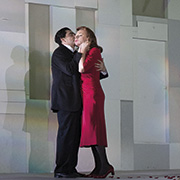Juliette, Martinů’s opera of 1937, has stimulated several opera companies to stage new productions in the last few years. Evidently it touches on the contemporary zeitgeist.
Bohuslav Martinů’s full-length opera Juliette où la Clé des Songes (1937) to a libretto by Georges Neveux may now be considered his most successful stage work, particularly following the publication of an Urtext edition of the work in 2005. Its multi-layered relationship to a linear and causal narrative structure, refracted through the theme and logic of dreams, and with its music vibrant with colour and full of longing, is increasingly attracting the interest of directors and conductors. Its attractiveness is closely linked with what the composer himself described as “two different elements” present in his work: “firstly the reality which, however, does not take place on the stage, and secondly the dream which is evoked through a realistic recollection, a dream of longing, Juliette.”
Intriguingly, the ability to dream was interpreted entirely positively until a few years ago in the context of Juliette. And as a result, this piece, whose only remotely ‘real’ person is the Parisian bookseller Michel Lepic, was robbed of its complexity. Michel arrived in a small French port three years before the beginning of the plot, and heard a female voice singing from a mansard window. After his panic-stricken departure, he ventures to return in order to find the window, the girl and the song again. But the townspeople appear like contextless shadowy figures. Only through Michel does the listener learn a little about their background, clothing, occupation, parents, place of residence and appearance. Nothing is known about Juliette, the object of his longing – all the other figures are characterized only through their ethnicity, occupation or clothing. They are only distinguished by obsessions – a “man with a helmet” imagines that he owns a steamer, a “birdseller” is possessed by the idea that her canary has been stolen, etc.
Gradually it is revealed that what drives these “people without characteristics” is not a creative dreaming, but a flight into the world of dreams. In this strange world only objects are in fact real, and not the people vegetating between them who make an incoherent and unstable impression similar to Salvador Dalí’s melting watch. As their stories are not compatible, it is impossible for them to communicate with each other.
Dreams have degenerated into commodities. But Martinů and Neveux do not treat them disparagingly. Through the poetry of the language and the musical lyricism, they make them comprehensible, indeed almost credible. They show sympathy for the tragedy of their protagonists without, however, wanting to excuse their instability. But the opera ends tragically – Michel “shoots” Juliette and with her also what is positive about his dream, its longing. Faced with the possibility of returning to real life with the certainty of this loss, he recoils. Instead he throws himself into the doorway of the “central bureau of dreams”, a vacuum inhabited by “grey figures”.
Right at the beginning of the overture, we hear a disturbing quotation on high bassoon from the introduction to Stravinsky’s Le Sacre du Printemps, a consciously deployed “ready made” means of announcing the surreal prevailing mood of the opera. Its stylistic breadth ranges from the ensemble scenes associated with Mozart’s comic operas of the first act, via the passionate longing of the lyrical second, to the dark cold of the despairing third act. Characteristic of the treatment of the vocal parts is the setting of the faster recitative sections which is similar to natural speech inflections; Martinů himself described this using the French concept of “melopée”. The warm melodic style of the lyrical scenes is largely independent of the instrumental accompaniment. The orchestral score is characterized by an uninterrupted symphonic stream, so that it can be performed entirely independently on the concert platform.
Juliette is more than just a dream opera on an unresolved love story. It is at the same time a bitter-cheerful parable on human longings in general and on inadequate communication, on the abandonment of memory leading to the easy manipulation of people. The fact that this is achieved with much humour and an idiosyncratic, beautiful poetry makes this opera even more unique.
Aleš Březina
(translation: Elizabeth Robinson)
(from [t]akte 2/2016)



